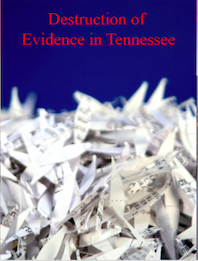- Contact Us Now: (615) 490-6020 Tap Here to Call Us
Destruction of Evidence in Tennessee

Oftentimes in litigation, parties continuously seek the all-important piece of evidence to help win their case. This vastly important piece of evidence is sometimes known as a “smoking gun.” Some examples of a “smoking gun” may include the video of an injury that occurred on the premises of a business that clearly shows the injury was the fault of a third party, or an important email that indicates sexual harassment or racial discrimination. However, it is not always easy to obtain this information and unfortunately sometimes parties choose to destroy evidence in hopes of hiding any evidence that may confirm their legal liability. What happens if a party destroys relevant evidence?
In 2015, the Supreme Court addressed this issue in a case know as Tatham v. Bridgestone Ams. Holding, Inc., 473 S.W.3d 734, 737, 2015 Tenn (https://www.tncourts.gov/sites/default/files/tathamleeann.opn_.pdf)
In Tatham, the plaintiff was in a serious car accident. Plaintiff alleged that the car accident occurred due to the failure of a new tire purchased from Defendant. Plaintiff brought a products liability case against the seller and the manufacturer. At the instruction of her insurance company, the plaintiff transferred title to the vehicle (and tire) to a third-party wrecker service. In ordinary practice, the wrecker service destroyed the tire and car. After the car and tire were destroyed, Plaintiff filed suit against the defendants. The defendants filed a motion for summary judgment requesting the court to dismiss Plaintiffs case because the tire was destroyed, and Defendants were prejudiced because they never got a chance to inspect the tire. The trial court refused to award the sanction because it held the plaintiff did not intentionally destroy or otherwise spoliate the tire. The Defendants appealed, arguing the trial court abused its discretion. This issue was addressed by the Supreme Court. The Supreme Court upheld the Trial Court’s decision not to award sanctions and in the process developed a new four (4) factor test for the Trial Court.
As a result of Tatham , the Tennessee Supreme Court developed a new four (4) factor test regarding the destruction/spoliation of evidence. The four factors are listed below:
(1) the culpability of the spoliating party in causing the destruction of the evidence, including evidence of intentional misconduct or fraudulent intent;
- In examining Factor #1, the Court will determine if the conduct was accidental or intentional. If it is proven that a party willfully destroyed relevant evidence, then this factor will help the non-spoliating party. If it is accidental, this factor may benefit the party who destroyed the evidence.
(2) The degree of prejudice suffered by the non-spoliating party because of the absence of evidence;
- Factor #2 concerns how much each party is harmed by their ability/inability to examine the relevant evidence. In Tatham, neither party was able to review the tire in question, so the Court did not weigh this factor heavily to help or hurt Plaintiff or Defendant. If one party was able to view the evidence, then it was destroyed without the other party viewing it, the Court will consider factor #2 in their analysis.
(3) Whether, at the time the evidence was destroyed, the spoliating party knew or should have known that the evidence was relevant to pending or reasonably foreseeable litigation;
- Factor #3 is important because opposing parties commonly disagree on when litigation is “reasonably foreseeable” and it may vary from case to case. For instance, if a party is seeking to obtain the video of an injury that occurred at a business and they inform them of this by sending a litigation/legal (https://www.zapproved.com/blog/what-is-a-legal-hold/) hold letter immediately after the accident, then litigation should be considered “reasonably foreseeable” upon their receipt of the legal hold letter.
(4) The least severe sanction available to remedy any prejudice caused to the non-spoliating party.
- Lastly, factor #4 states that the Court should show some restraint in sanctioning any party for destroying/spoliating evidence.
How might the Court punish a party who destroys evidence?
The court will examine each scenario on a case by case basis using all four (4) factors listed above before sanctioning any party for destroying evidence. The Trial Court may choose to impose sanctions under Rule 37 of the Tennessee Rules of Civil Procedure. The Court has a wide discretion of sanctions that they may Order which range from an adverse inference (https://definitions.uslegal.com/a/adverse-inference-rule/) all the way to a Default Judgment. A Default Judgment is normally reserved for the most severe behavior.
How might destruction of evidence impact your potential legal matter? Examples below:
- You are preparing for a divorce in Williamson County, TN, and you are worried your spouse may destroy relevant evidence concerning inappropriate marital conduct and/or dissipate marital assets.
- You have been the victim of racial discrimination or sexual harassment and all relevant emails/information are on the company’s private internet server.
- You have been injured on a third party’s property and you need to obtain the relevant video evidence that is solely in the third party’s possession, custody and control.
These scenarios demonstrate the importance of preserving important evidence and retaining skilled and competent counsel for various legal disputes in Tennessee. The Cole Law Group litigation attorneys in Nashville can help to ensure that important evidence is preserved prior to prosecuting or defending parties in diverse types of litigation.















